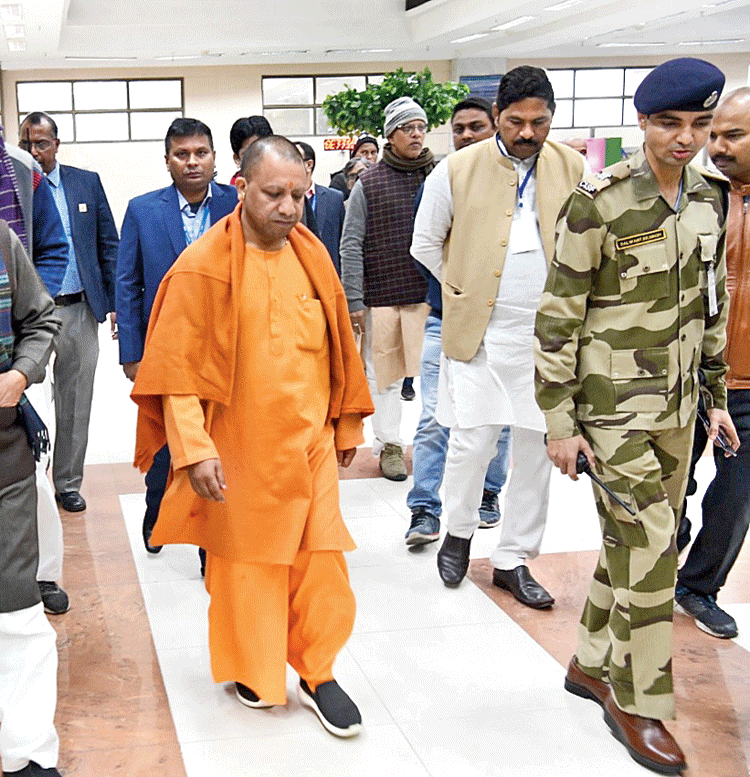Uttar Pradesh chief minister Yogi Adityanath has forwarded to the central government a list of 32,000 people from Bangladesh, Pakistan and Afghanistan who have been living in the state on long-term visas, kicking off the process of identifying refugees for implementing the Citizenship (Amendment) Act.
All those named in the list — the first such sent by the Adityanath government — are Hindus from 19 of the state’s 75 districts.
A home department source said the list includes at least one person from Agra and at the most 700 from Lucknow.
“The state government on December 17 had sent letters to all 75 district magistrates to identify people originally from these three countries and who have been living in the state from before December 31, 2014,” the officer told The Telegraph, reminding that Adityanath was also in charge of the home ministry.
The officer said the first list was sent on January 10 and the next with over 30,000 names would be sent soon.
Srikant Sharma, spokesperson for the state government, confirmed that the first list of 32,000 people had been “identified and forwarded” to the Centre. “It is a process which will continue till all those who (come under the ambit of the act) get the benefit of the CAA,” Sharma said.
The act — which came into effect from January 10 — essentially seeks to fast-track citizenship for non-Muslim migrants who fled persecution in Bangladesh, Pakistan and Afghanistan and arrived in India before January 2015.
The state government’s list suggests that Adityanath had started the process of identifying the migrants at a time protests were going on across the country against the contentious law and his police were cracking down on people with an iron hand.
“Modi and home minister Amit Shah believe that Adityanath’s popularity is going down very fast and this may be hazardous in the 2022 Assembly polls for the party. But Adityanath is trying to prove that he is the one most loyal to Modi and Shah compared with other BJP chief ministers,” said a senior BJP leader in Lucknow but asked not to be named.

Yogi Adityanath was addressing a public meeting called by the BJP, in power in Bihar with ally JDU, to defend the amended citizenship law. Adityanath was defending CAA and attacking Pakistan when the first couple of balloons appeared and rapidly rose in the sky. As he spoke on, more balloons started appearing. The audience caught sight of them, got distracted and started murmuring. Still more balloons appeared, this time bunched together and carrying black flags that said: “No CAA.” As the organisers tried to ignore the black dots in the sky and vociferously shouted slogans in support of the BJP and the CAA, Adityanath cut short his speech and left. The Uttar Pradesh chief minister had vowed revenge against the CAA protesters in his state. At least 19 people have been killed in police action against the protests in Uttar Pradesh.
The first protest in the state had started at Aligarh Muslim University on December 15 when the police and the Rapid Action Force barged into the campus and allegedly opened fire on students. The police have denied the allegation of opening fire.
Over 10,000 students were booked the next day.
Protests had continued across the state till December 22, leaving at least 20 people dead in incidents of violence, including a child. In some cases, people themselves had approached the district administration concerned for including their names.
Among them was Fakhra Orin, a 45-year-old who said she was a Hindu from Karachi now living in Bulandshahr. “I and half-a-dozen members of my family have submitted applications with the district administration to give us citizenship. We have been living here on long-term visas for the past 20 years.”
Santosh Kumar Singh, senior superintendent of police, Bulandshahr, said: “We have received 24 applications from the district — 19 women and five men. They are all from Pakistan, excluding one man from Afghanistan.”
Bulandshahr sub-divisional magistrate Ravindra Singh said: “Whatever applications we receive would be viewed in the light of the CAA and the process started for the same.”
An additional superintendent of police in Lucknow said they too had a list of people living in the state on long-term visas.
The visas are renewed every year on the basis of reports from the local intelligence unit.

